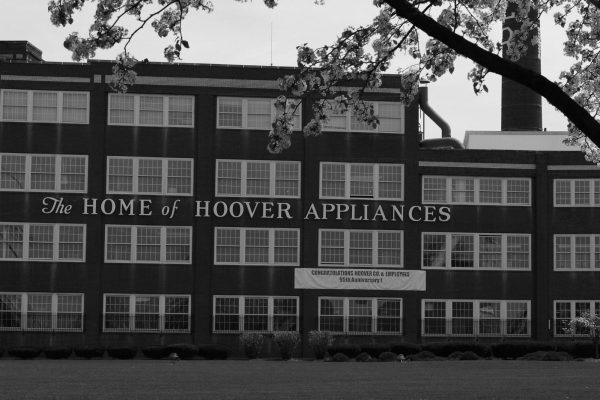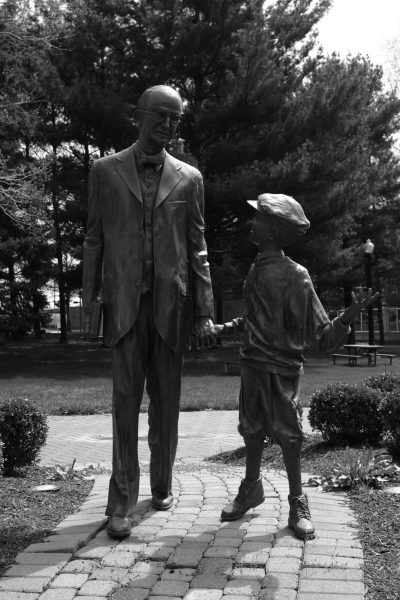
Q: Can you provide an overview of the founding and early years of The Hoover Company in North Canton? What motivated the establishment of the company?
A: William “Boss” Hoover founded a leather goods company in 1870 with his two brothers on the family farm on east Maple Street (present day Hoover Historical Center). By 1873, the two brothers had left the business and “Boss” relocated the tannery down the road closer to the center of New Berlin (now North Canton). The business quickly grew as was known for producing high-quality leather goods (such as horse collars) throughout the Midwest and East Coast. “Boss” had started the company after returning from college, he attended Mount Union in Alliance. He took the family’s knowledge of making leather and turned it into a business that made high- quality leather goods. By the early 1900’s, automobiles became more prevalent, thus reducing the market for horse products. Luckily, in 1908, a janitor from a department store in Canton, James Murray Spangler, approached “Boss” and offered to sell him the patent for an invention that he had created called an “electric suction sweeper.” “Boss” took a chance and bought the patent and began manufacturing and selling the electric suction sweepers AKA vacuums in the same year. The product took off and that was the beginning of a global empire. “Boss” really just had an entrepreneurial spirit and had a desire to start a business from a young age. It is my belief that he chose leather goods because the Hoovers had been making leather for generations. What made his business so successful was that he made a finished product, not just leather and, very importantly, he was always insistent on making a high-quality product.
Q: How did The Hoover Company contribute to the local community and economy in North Canton during its initial years of Operation?
A: From the very early days of the company, The Hoover Company was a major factor in the growth and development of North Canton. In 1905, the company employed 200 out of the 865 people who lived in the village. At its height, over 4,000 people were working at The Hoover Company in North Canton, there was a European headquarters outside of London, and factories across the globe. So, not only was Hoover the major employer in North Canton for over 130 years, but the company and the Hoover family were always very interested in the well-being of the community.= “Boss” was a lay minister at his church, he was elected the first mayor of New Berlin, and he was known to anonymously pay off debts of his employees when they fell on hard times. Later generations of the family continued this generosity even today as various Hoover family foundations provide funds to the schools, libraries, museums, the YMCA, and other organizations throughout the community.
Q: In what ways did The Hoover Company evolve and innovate over the years? Are there any significant milestones or changes that stand out?
Innovation in engineering, design, marketing, and sales were important factors in the success of The Hoover Company from the very beginning. You can have a great product, but if nobody knows about it, you aren’t going to make very many sales. Obviously, one of the most significant innovations was the introduction of an electric vacuum cleaner to a market that was filled with manual vacuums. In 1908, only 10% of homes had electricity, so manufacturing and selling a product that used electricity was a risk, but a risk that paid off! By taking out an advertisement in a December 1908 issue of the Saturday Evening Post that offered a free trial of the vacuum, The Hoover Company was able to establish a national sales and distribution system very quickly. Because the product worked well, once word got out about it, sales quickly increased. Within a year, improvements were introduced as well as new products. By 1919 they were selling vacuums in England and they sold the millionth Hoover vacuum in 1923. The second millionth vacuum was sold in 1927 and the third in 1931. Hoover introduced the first successful electric vacuum for home use (1908), the first light for a vacuum, the first hand-held vacuum, the first disposable paper bag for a vacuum, the first hard-surface cleaner that retrieved the soiled water, the first residential carpet washer.
Q: Can you share some anecdotes or stories about key figures involved in the founding and growth of The Hoover Company?
“Boss” Hoover is an iconic figure in Hoover and North Canton history. As the founder of the company, he played the most significant role in shaping the direction and culture of the company. He was a man of faith and someone who believed in helping those in need. As I mentioned earlier, if he heard of an employee who was down on their luck, perhaps falling behind on bank payments, he would anonymously have the debt repaid. In 1923 he built the Community Building (North Canton YMCA) as a gift to those who lived in North Canton and his employees. This came at a personal cost of $250,000. “Boss” was also responsible for establishing the first library in North Canton and the first art gallery. His eldest son, H.W. Hoover, Sr. became the second president of The Hoover Company, and he continued the family tradition of philanthropy. During WWII, he organized a plan to bring 84 children of Hoover employees in Great Britain to North Canton to keep them safe during the war in Europe. “Boss’s” oldest child, Mary Hoover Price, and her husband made significant contributions to many local churches and organizations. It is her portrait you see when you walk into the North Canton Public Library. They are also who Price Park is named in honor of. Today, the multiple foundations that the family setup are still giving significant gifts to the community. They support efforts at the schools (recent funded efforts include the storyteller van and renovations to Hoover Hall), the YMCA, the North Canton Heritage Society, and many others.
Q: Can you describe the role of The Hoover Company during significant historical events, such as wars or economic crises?
A: The company’s contributions to war efforts are significant. During WWI, the company had government contracts to produce materials for the US Army and the armies of other allies. These contracts were for leather goods and canvas items used by soldiers. Following the end of the war, the leather business was shut down for good and all efforts were directed to the vacuum business. Also during WWI, “Boss” started a newsletter called the “Newsy News” to keep local soldiers up-to-date on the happenings in North Berline (the name changed to North Canton during WWI through and effort “Boss” and other community leaders). This newsletter continued on after the war and eventually changed names to the Hoover News. The final publication was written in 2004. The company’s contributions during WWII were also significant as the factories were retooled to make wartime products such as parachutes for cluster bombs, small motors for gun turrets, inflatable life preserving belts, helmet liners, and, most- importantly, fuses. The Hoover Company produced tens of millions of fuses that detonated bombs for US military use. Company engineers also played a huge part in the creation of a proximity fuse that used radio waves to determine if the bomb was near a target to trigger detonation (rather than having to hit a target). Hoover also lead many war bond drives and spearheaded the humanitarian effort of bring the 84 children from Britain to stay in North Canton and surrounding communities from 1940-1945.

Q: When did the company leave North Canton? Why?
A: It is a bit of a long and winding road to the departure of The Hoover Company from North Canton. As I mentioned earlier, the company was founded in 1870 and moved to the corner of Maple Street and Main Street in 1873. It remained there until 2007. The Hoover family had maintained ownership of the majority of the company until 1985 when the company was bought by a holding company named Chicago Pacific. Chicago Pacific then sold the company to Maytag in 1989. At first, Maytag allowed Hoover to run as an independent company with their own executives and their own headquarters in North Canton. Eventually (late 1990s), Maytag ran into some financial trouble and downgraded Hoover to a division of Maytag. In 2006, Maytag was purchased by Whirlpool who had no interest in a floorcare division. Whirlpool sold Hoover and it’s properties in Stark County to a company called Techtronic Industries, or TTI in 2007. TTI pulled all manufacturing from North Canton and sold the property on Main and Maple to a real estate developer. While the effects of Hoover leaving North Canton were great, including the loss of jobs and tax revenue, North Canton has rebounded and continues to be a wonderful place to raise a family. I think it is a silver lining that Hoover vacuums continue to be manufactured and sold more than 100 years after they were first introduced. North Canton has certainly left it’s mark by being the home of The Hoover Company for so many years.
Q: Looking ahead, how does the Hoover Historical Center continue to preserve and share the history of The Hoover Company with future generations, and what initiatives or projects are currently underway?
A: The Hoover Historical Center was opened in 1978 as part of the celebrations of the 70 the anniversary of the first Hoover vacuum. The mission is to preserve the history of The Hoover Company and the Hoover family. You can’t find a person in the United States and beyond who hasn’t heard of, or likely used, a vacuum. The impact of The Hoover Company is global in scale. Not only do we serve as museum where people from across the world (literally, we have visitors for all over the world each year) can come and view Hoover history on display in the Hoover family’s 1853 Victorian Italianate farmhouse, but we also serve as a research center. Our archives are used frequently by scholars who research and write about the impacts of The Hoover Company. I also enjoy working on some of the more atypical research requests. For example, last year I worked with the British television company BBC Two on an episode of the series “The Secret Genius of Modern Life” where they focused on vacuums. I have also worked with the auction house Christie’s on a sale of a piece of art made by Jeff Koons that featured several Hoover products. The piece sold for over a million dollars. Another fun project was when a production company in Hollywood reached out to ask me to provide them a list of vacuums that Hoover manufactured from various years between 1980 and 2012. They needed this information because they were making a biopic on singer Whitney Houston and, apparently, she liked to vacuum to destress. Every day is different and exciting. Recently, we started an annual event called the Hoover Park Festival. This is a free, community event that is held in the property behind the museum in July. It features a variety of family-friendly events such as history talks, museum tours, musical performances, vintage baseball, food trucks, and children’s activities. Everything that happens during the festival has a connection to the history of The Hoover Company and it is a fun way to keep this history alive for our local community. The festival has been sponsored each year by TTI, the current owners of the Hoover brand, and I have found it to be an important way to keep Hoover connected to North Canton.
Q: Anything else you would like to add?
A: Each year I go into the third-grade classrooms throughout North Canton and I tell them the story of The Hoover Company. Although the company left North Canton in 2007, I believe that it is important for children to learn about the impacts of the company on our town and to recognize the work of thousands of North Cantonians in making the company the global success that it was. Perhaps even more importantly, I want the kids to know that any one of them has the potential to take an idea and turn it into something that can impact generations to come. “Boss” was a kid who grew up on a farm down the street from us and here we are, 154 years later, still talking about The Hoover Company!


